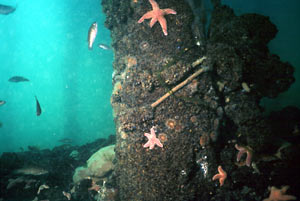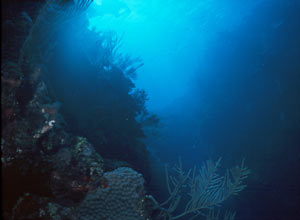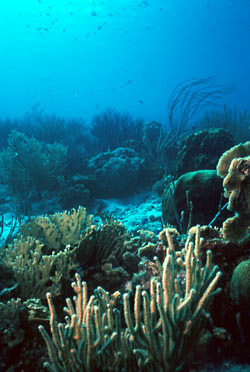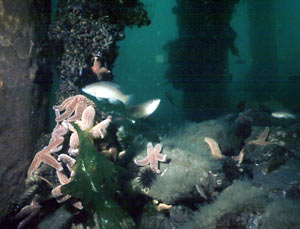An Introduction to Environmental Ethics
BY DAVID E.W. FENNER
 |
| Photo ©Shaun Snee |
Philosophers tend to divide the academic approach to ethics into
two domains: theoretical ethics and practical/applied ethics.
Environmental ethics is a practical/applied ethic; it is a system
for determining correct action with regard to the natural world,
either in specific situations or in terms of a general approach to
the environment. "Environmental ethics as applied ethics," makes it
sound as if environmental ethics is primarily or even exclusively
the application of theoretical ethics-- the sorts of systems we get
from the likes of Kant and Mill-- to environmental problems. This
seems to be the wrong way to think about environmental ethics. It
seems more functional and realistic to think about environmental
ethics as the application of values. We start with our values, and
then we see to what sorts of things those values committed us. When
it comes to the natural world, there are a variety of positions
that may describe an individual"s values. A good place to begin is
with an exploration of what one holds to be of ultimate value.
"Ultimate values," are "core values," values people hold that they
would never relinquish and for which the question, "Why value
that?" is virtually meaningless. For instance, if I were to hold
human life as ultimately valuable -- what philosophers like to call
"intrinsically" valuable -- then when asked, "Why do you value
human life?" my answer can only be, "Because it"s valuable." Full
stop. If I were to answer the question, "Because it allows me to
experience the world," or, "It allows me to enjoy being with my
family," or, "It allows me to explore my spirituality," then life
is not my ultimate value. It is merely a means or an instrument
that helps me reach something I value even more deeply (i.e.,
experience, family, or spirituality). So, a good place to begin to
explore one"s environmental ethic is an exploration of one"s own
ultimate, core, or intrinsic values. If one holds the entirety of
the natural world as valuable -- valuable on its
 |
| Photo ©Shaun Snee |
own, without reference to human interests -- her position could be
called "ecocentrist." Probably the most famous ecocentrist was Aldo
Leopold. In his book, A Sand County Almanac, Leopold fashions the
"Land Ethic." The "land" is his word for the entire ecosystem taken
as a system. In the Land Ethic, the particular parts of the natural
community are not unexpendable (the loss of one tree or one bird is
not a problem). What is valued is the preservation of the entire
natural system in balance, along with preservation of a healthy
representation of all the members of that system. Leopold writes:
All ethics so far evolved rest on a single premise: that the
individual is a member of a community of interdependent parts...
The land ethic simply enlarges the boundaries of the community to
include soils, waters, plants, and animals, or collectively: the
land... In short, a land ethic changes the role of Homo Sapiens
from conqueror of the land-community to plain member and citizen of
it.1
 |
| Photo ©Shaun Snee |
A modification of ecocentrism is "biocentrism," where the living
elements of the natural world are seen as intrinsically valuable.
On this view, biological entities-- plants and animals-- are
considered intrinsically valuable. Biocentric approaches to
environmental ethics include, but are not limited to, views that
focus on animal rights. The nineteenth century philosopher Jeremy
Bentham probably offered the first philosophical treatment of
animal rights. Bentham writes, "The question is not, Can they
reason? nor, Can they talk? but, Can they suffer?"2 Peter Singer,
author of the famed Animal Liberation (Avon, 1991), writes:
Many philosophers have proposed the principle of equal
consideration of interests, in some form or other, as a basic moral
principle; but . . . not many of them have recognized that this
principle applies to members of other species as well as to our own
. . . Other animals have emotions and desires and appear to be
capable of enjoying a good life... Surely every sentient being is
capable of leading a life that is happier or less miserable than
some alternative life, and hence has a claim to be taken into
account. In this respect, the distinction between humans and
nonhumans is not a sharp distinction, but rather a continuum along
which we move gradually, and with overlaps between species, from
simple capacities for enjoyment and satisfaction, or pain and
suffering, to more complex ones.
There are many who see only the human species as having intrinsic
value. This approach is broadly called, "anthropocentrism." The
anthropocentrist holds that the natural world is merely
instrumentally valuable and available to serve human interests.
This is a popular approach. Perhaps it is so popular because it is
the one most clearly advocated by mainline Christianity and the
cultures in which Christianity plays so strong a role. The writer
of Genesis says:
 |
| Photo ©Shaun Snee |
And God said, "Let us make man in our own image, after our
likeness; and let them have dominion over the fish of the sea, and
over the fowl of the air, and over the cattle, and over all the
earth, and over every creeping thing that creepeth upon the
earthÉand God said to them, Be fruitful, and multiply, and
replenish the earth, and subdue it: and have dominion over the fish
of the sea, and over the fowl of the air, and over every living
thing that moveth upon the earth."4 Although this Biblical passage
seems to give "man" a great deal of latitude, most Christians
modestly prefer to interpret this passage as God giving humans a
stewardship role over "creation." Humans are meant to use the earth
and its resources for their own well-being; but they are also meant
to care for it, so that it will continue to support human survival
and flourishing. In a traditional anthropocentric view, one finds
value to be in and about human interests. Humans have a clear and
abiding interest in living in a healthy environmental context. We
immediately value the air we breathe, the water we drink, and the
food we eat. We also value the natural "resources" from which we
make our livings, whether those natural elements are used directly
by humans (as in the timber, petroleum or ore industries) or used
indirectly (as in industries which use power generated by
petroleum, etc.). It is our collective duty, then, to take care of
our natural environment(s) in order to meet the needs and desires
of humans.
There are, of course, other anthropocentric approaches. Some
focus on the mental well-being that one can achieve through
experiences in nature; some focus on the beauty of the natural
world; others focus more narrowly on the individual self.
 |
| Photo ©Shaun Snee |
Those views that focus on the individual self are called
"egocentric." Here, one finds value to be in and about proximal
human interests. By "proximal," I mean, "close." Some theorists
object that humans do not necessarily care about what happens to
other humans on the other side of the planet, but they do care
about what happens to them. Is this a "selfish" ethic? It depends
on how you look at it. Suppose one is concerned with oneself, with
his or her own interests, survival and flourishing. Wouldn't that
individual also be concerned with the interests of his or her
spouse? Children? Grandchildren? Friends? Relatives? Neighbors?
Colleagues? "Pets?" One who has "proximal" values has values
regarding those with whom one finds oneself in relation. It is, on
this view, each person's duty to take care of the natural
environment, of him/herself and all those with whom s/he has a
relationship; this could translate into one taking care of his or
her neighborhood, community, town or even state or nation. We
usually call this, "Enlightened Self-Interest." The key to
understanding this ethic is to understand properly the scope or
range of "self-interest." Above was noted that the scope of
self-interest includes all those others (even some non-human
animals) who are in relationship with the person in question. But
it is equally important to note that the scope of self-interest
also extends in time: I am not just concerned with my present
interests, but in my future ones as well; I am not just concerned
with my children's interests, but with my (potential)
grandchildren's interests, too.
In terms of environmental ethics, the "least common denominator" is
the last in the above list. People can be regularly counted on to
do what is in their own interests. This does not mean they are
unethical or even that they are selfish. They just have a simple
system of ethics that starts with what they most immediately, and
in fact, value.
 |
| Photo ©Shaun Snee |
If this sort of ethic is one we can expect every human being to
share, how is it, then, that human beings can fail to do the right
thing? If environmental-ethical motivations are a matter of human
nature, why do we find unethical acts being committed against the
natural world? It is too often the case that people do not do the
right thing -- even when it is explicitly in their own interests to
do so -- because they "cannot see the forest for the trees." They
focus on short-term goals rather than on long-term goals. If one's
goal is to put food on the table, then the healthfulness of the
food and the cleanness of the drink that ends up on that table may
be ignored or suppressed as a goal, so that one can focus on the
goal of building that off-shore oil rig, the completion of which
means that he can keep his job. The short-term goal of maintaining
a job with a good salary, so that one can put food on the table,
may overwhelm the long-term goal of engaging only in those actions
that contribute to the food on the table being edible and safe. I
do not want to say this is the only explanation to the problem of
how people seem to defy their own best interests, but I think it is
an explanation which focuses on a very common phenomenon today: not
seeing the forest for the trees.
The good news is that (almost) everyone has an environmental ethic.
It
 |
| Photo ©Shaun Snee |
may not be one that is highly systematized or even very considered;
but, except for pathologically antisocial individuals, everyone
holds some values that concern her interaction with the natural
world. Apparently, everyone starts with the "least common
denominator" view mentioned above. But many move beyond this view
and take on a higher, less anthropocentric, ethic by finding value
outside just the human self. Change or growth, though, must be
internal and self-motivated. The move from the "least common
denominator" view to a larger environmental ethic can be encouraged
by providing opportunities designed to foster or serve as a context
for individual growth. "Moralizing" and "proselytizing" will not
work, but facilitation and guidance will. The key is experience --
and, of course, appreciation of the experience of the natural
world. It is through such experience that we will grow as
environmentally ethical persons.
REFERENCES
Leopold, A. A Sand County Almanac (Oxford University Press,
1949), pp. 203-204.
Bentham, J. Introduction to the Principles of Morals and
Legislation, Ch. XVII (1789). Singer, P. "All Animals are Equal" in
T. Regan and P. Singer, eds., Animal Rights and Human Obligations,
second edition (Prentice Hall, 1989), pp. 78 and 82. This essay
first appeared in Philosophical Exchange I (5), 1976.
Genesis, Chapter 1, Verses 26-28, King James Version.
Copyright ©2004 Global
Underwater Explorers.
All rights reserved.
|








